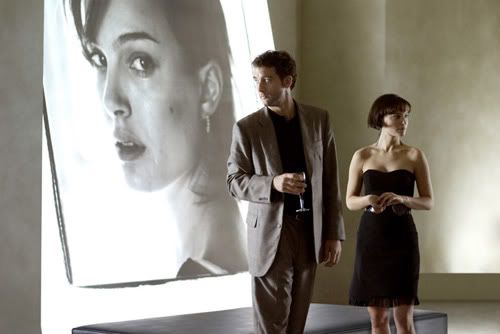"Have you ever seen a human heart? It looks like a fist wrapped in blood!"
 I've been meaning to see Closer for some time now, but despite that desire something always came up that prevented me from checking it out in the theater. I finally got around to it and, maybe it's because the last two movies I saw before it were The Pacifier and 50 First Dates, I was quite impressed. I'm not familiar with the play at all, so I can't comment on its transition to the screen, though I disagree with the criticism often leveled against the film that it feels too stage-y. The dialogue is fairly roundabout, but not by any means obtuse or difficult, in fact its terseness helped it feel natural to me, like a more realistic David Mamet.
I've been meaning to see Closer for some time now, but despite that desire something always came up that prevented me from checking it out in the theater. I finally got around to it and, maybe it's because the last two movies I saw before it were The Pacifier and 50 First Dates, I was quite impressed. I'm not familiar with the play at all, so I can't comment on its transition to the screen, though I disagree with the criticism often leveled against the film that it feels too stage-y. The dialogue is fairly roundabout, but not by any means obtuse or difficult, in fact its terseness helped it feel natural to me, like a more realistic David Mamet.The film was pretty visually subdued. Most of the shots in it are static, choosing to focus more on capturing the moments between the characters. This is an actor driven film and lots of the imagery in it is portrait-based, perhaps going in line with Anna's own beautifully photographed sad strangers. There were a few striking moments, however, such as when Clive Owen's character, Larry, walks out of the kitchen after an argument with his wife, Anna (Julia Roberts), and the camera hangs back in the door frame watching him from behind as he walks away. The camera shakes just a little bit when he stops, underscoring his own shakiness at that particular moment. That or the cameraman sneezed or something. Either way, his shakiness and vulnerability quickly give way to aggression, and after that he begins to attack Anna with all sorts of discomfiting questions that only serve to expand the rift between them, eventually making it uncrossable. He is not out for understanding at that moment, he is out for blood.
Closer is filled with moments like that one, characters constantly going on the defensive, waiting for their opportunity to lash out at one another and then going straight for the throat. That's sort of why I'm puzzled by all the praise I've heard this film receive for its supposed honesty and accuracy regarding romantic relationships. To me the film is not about those kinds of relationships at all, but rather about combat. At one point Larry tells Alice (Natalie Portman) that women are the territory for men and she responds by saying "It's not a war." She's wrong, it is a war for all these characters, which isn't to say that there is no love in them, simply that it isn't always their primary motivator.
When Dan (Jude Law) picks Alice up at the start of the film, it feels methodical, like he is planning out all of his moves ahead of time. When it is revealed later on in the film that he tells the cabbie she is his girlfriend before they have even introduced themselves to one another, that fact is emphasized. Later on when he and Alice have their argument in the hotel room and he walks out, sees himself in the mirror and realizes he has fucked up, he goes back to talk to her thinking that it will gain him ground with her. She sees this and cuts him off before he can lay his cards out. Every move these characters make is like a carefully planned move in a game of chess. None of it is motivated by their affection but rather by their desire to have or get rid of something, a constant juggling and re-valuing of their possessions.

In order to assess the worth of a possession, you've got to understand its relationship to you. As a result, there is a constant push towards "truth" from the characters that only results in them hurting themselves. By finding out "the truth," they can find out if the love they have is worth something to them, rather than settling for being happy with the fact that they have it. The most noteworthy scene in regards to this is the aforementioned kitchen argument in which Larry wants to know about Anna's relationship with Dan. He asks her many questions, pushing her in the meanest ways he can and reveling in her obvious apprehension and discomfort until she finally lashes out and says what he wants to hear, not a response but an affront. She answers his question in the most hurtful way possible. And that's when he tells her to fuck off and die. There is a strange sense of love in these peoples' relationships that they keep messing up with constant prodding. Even though he knows Anna has violated their trust for the past year, Larry can not muster up the strength to tell her off until she has said something hurtful to him first. The closer these characters come to the so-called truth, the further they drive themselves away from each other.
Labels: closer, mike nichols



1 Comments:
sup andrei
Post a Comment
<< Home